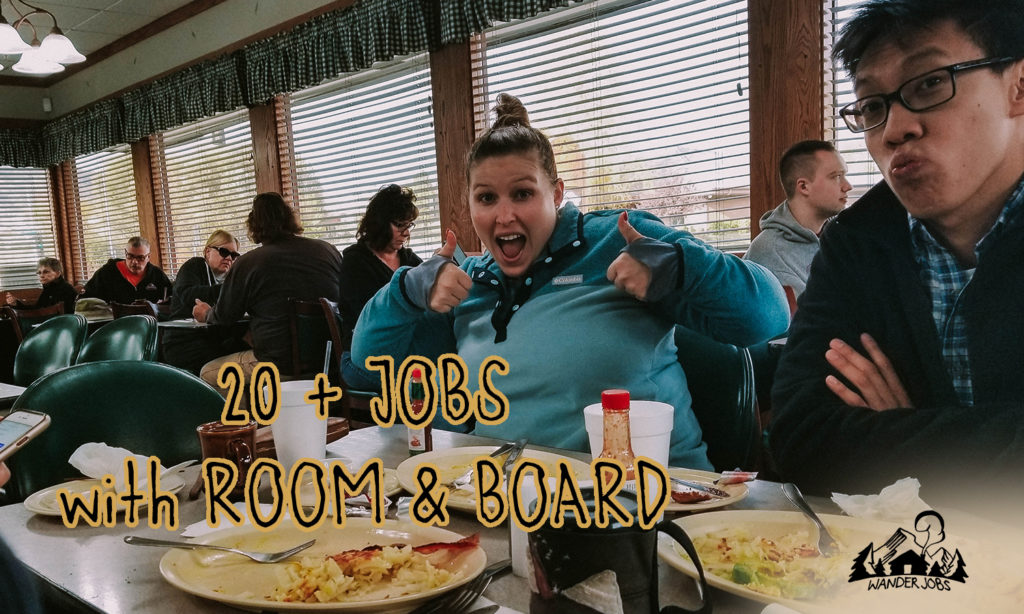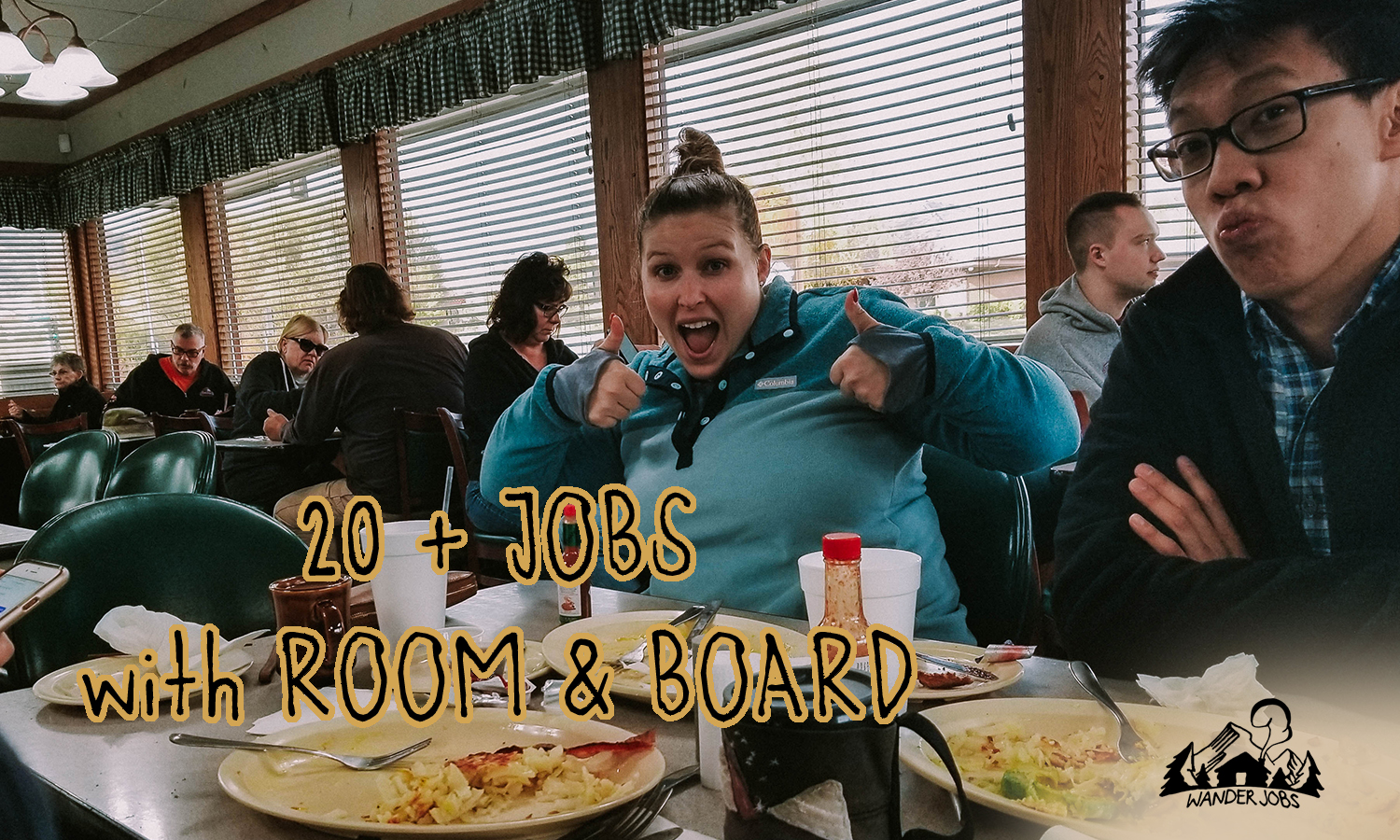
Some people travel for work, others work for travel. If you have the travel bug, you may be surprised to learn how many different jobs come with room and board.
When room and board is pre-arranged by your employer, you can just pack your bags and go. To the next place, and the next place, and the next, traveling this way as long as you like. There’s no need to sign leases or do complicated long-distance searching for roommates on Craigslist. Instead, you’ll be moving right into a community of your peers.
The companies most likely to offer employee housing to staff are in tourism and customer service industries in off-the-beaten-path locations. Though there are other types of businesses and non-profits that house their employees, as well.
Below are some of the ways you, with any level of experience, can break into the employee housing scene.
Outdoor Adventure Jobs
- Ski resort jobs
These are some of the easiest jobs to land. Ski resorts hire massive numbers of employees every winter season. (But pick your resort wisely- the larger ones have bad reputations). Novices to the ski scene can easily get jobs as lift operators (lifties). Those who can ski or snowboard can go through paid training to become instructors.
Ski resorts usually have plenty of openings in housekeeping, customer service, and food and beverage, as well. - Conservation trail crews
Conservation positions skirt the line between volunteer position and job, usually leaning more toward volunteer. Most of the large organizations are non-profits (ACE, SCA) and provide stipends and education awards.
Maintaining hiking trails is tough physical work, usually taken on by young people and students. Crew leader jobs require a bit more experience in the field.
Some companies provide housing only during “on” shifts- the weeks where you are actually doing the work. Others provide or help volunteers find housing between shifts as well. - Scuba
Dive instructors are most in demand in tropical zones that attract tourists. (Scuba is subset of the “remote island jobs” we’ll discuss later.) These jobs aren’t exactly easy to get; earning licensing and experience takes a good amount of time and money. But PADI certification certainly travels well for those willing to make the investment. - White water rafting
If you become employed as a raft guide, you’ll need to go through very extensive training. It’s a potentially dangerous field of work, though the excitement is what draws people in.
Like many outdoor adventure companies, white water rafting tours companies usually operate in wilderness areas. The fact that there are few locals to fill these particularly intense positions means that the companies have to offer travelers room and board. - Bicycle/vehicle tours
Naturally, companies will need to provide their employees with a safe place to sleep while leading traveling tours. As a potential employee, you’ll need to have plenty of biking/bike maintenance experience. This isn’t an entry-level job. - Travel tour groups
Group travel tour guides get cushy accommodations and meals in the same hotels as the customers.
As a travel guide, you don’t need to have the same level of fitness or interest in the outdoors as bike guides. Travel tour groups exist all over the world. Many of them are sightseeing and guided adventure themed, though the adventures are usually outsourced to other companies. (Think ziplining, kayaking, snorkeling, etc.)
There are hundreds of these travel tour companies (at least), so a google search will bring up plenty of options.
- Wilderness Therapy Field Guides
Wilderness therapy can be highly rewarding job. It mixes the challenge of being outdoors with the challenge of helping people who have mental, emotional, behavioral, and other issues.
This job is for the more experienced. You’ll need at least some leadership roles under your belt, and ideally education in a related field.
Customer Service Jobs
- National Park Lodges
While yes, you can work for the national park itself, park ranger jobs are significantly more competitive than their cousins in hospitality- National Park lodge and resort jobs.
In order to operate within a park, a company must apply to become an official park concessioner. Naturally, these companies are remote tourist hotspots, a perfect recipe for seasonal jobs with employee housing.
If you are halfway decent at writing résumés and interviewing, it is easy to get an entry level job at a park lodge. Jobs run the gamut from housekeeping, check-in, and prep cooking (all fairly easy jobs to get), to marina and campground staff, water sport guides, and restaurant management.
There’s something for every experience level, and employees range from high school age to retired seniors. Search through WanderJob’s current list of National Park Job openings. - Wilderness lodges
Most wilderness lodges are smaller than their National Park lodge counterparts. You can find them in abundance all across the US and internationally. These lodges hire a smaller staff, but it means that housing can sometimes be very cozy and private.
Wilderness lodges come in many flavors: canoe outfitting, hunting, fishing, or just peaceful and wholesome family retreats.
Staff may be multi-purpose, doing whatever needs to be done for the day. Or they may work in any number of customer service or operations positions. You may find yourself cleaning rooms and checking in guests one day, and giving art lessons and setting up a picnic the next. (I speak from experience on that one!) - Hostels
Hostels are famously easy places for travelers to find work. Many travel bloggers have shared their experiences of arriving at hostels, asking for work, and living there for free in exchange for part time hours.
It’s not always comfortable to just hope you’ll find a job when you get somewhere, though. You can find hostel work exchanges in advance through volunteer work exchange sites like workaway.info. - Remote island resorts
Far away from everything and catering to masses of tourists, resorts on islands (not always tropical!) often need to provide housing to be able to hire enough employees. You’ll find the full range of hospitality and customer service jobs at these types of places.
To find resort jobs on islands, it will help to get specific with your google search. For example, “Washington island resorts,” is a much stronger search than “island jobs.”. When you find a resort that sounds good, go to their employment page to see if they offer housing. This information may not be available in many places online expect for the employment page. - Retreat centers
Like island jobs, many retreat centers are far from towns and need to provide employee housing to attract enough staff. This is a type of institution all its own; if you’ve ever been to or worked at a retreat center, you’re well aware that the “vibe” is much different.
Call it spiritual, hippy, bohemian, laid back, chill- whatever the case, retreat centers are usually very welcoming and inclusive places to work. You’ll meet all sorts of different people on different paths in life. - Horse ranches
Ranches do hire wranglers, but as with lodges and retreat centers, the bulk of their employees are hospitality and customer service workers. Some ranches also hire activities staff for guest events and experiences.
Caregiving Jobs
- Au pair
The first job on our list in which your employer won’t be a company. Au pairs are live-in nannies for families around the world. Young people choose to be au pairs because of the excellent opportunity for cultural exchange and adventure.
Au pairs get a regular paycheck, a room of their own, and sometimes get to join family meals for free. Most families with au pairs choose to treat them like family, taking them along on vacations, outings, and social events. - Residential overnight camps
Sleep away summer camps are only the tip of the iceberg in this category. There are of course, plenty of traditional summer camps with the usual activities (swimming, arts, campfire songs). At these camps, bunk counselors will be assigned to a camp group and sleep in the dorm with them. Activities instructors may get private rooms or share with other employees. Meals are included.
But you can also choose from plenty of year-round specialized camps. Some of these cater to overnight school field trips and are educational in nature. (Space Camp is one of the best known in this category.) There are even camps for adults now!
Tip: narrow your search down to a specific place and look for residential camps in that particular area. - Caregivers for seniors
Many of these jobs can be found through reputable companies. Others are listed on community and work exchange sites (think craigslist, workaway).
Employment as a caregiver is a decidedly different experience from most other jobs on this list. You’ll be interacting with only a small number of people on a daily basis, and may not have any coworkers. Caring for someone takes responsibility and maturity. - Boarding schools
Travelers don’t usually seek out employment at boarding schools; it is usually more of a permanent career path for social workers and those with experience caring for children.
I’ve included it on the list because I know a traveler who worked temporarily as a house dad. He had 12 high school aged boys in his care. He was in charge of cooking meals, providing homework help, scheduling, and generally counseling the children.
Other Jobs with Room & Board
- Cruise & charter ships
Living on a ship is intense. You’re in close quarters with your coworkers constantly, get disappointingly little shore time, and don’t make all that much money. However, I’ve met cruise ship staff who seem to think it’s an unforgettable experience. Even if they don’t want to stay long.
It’s not terribly hard to land one of the hundreds of entry level positions on a huge cruise liner. They have all the need for hospitality staff as any large resort, and more. But it may be more challenging, and also more enjoyable, to work on a small charter ship.
These charters are the super expensive luxury cruises you may have heard about; they tour European rivers, or go on expeditions into the Amazon or the Arctic. They carry a much smaller payload of people and are choosier about the staff they hire. But it’s likely your experience will be better if you can get on a ship this size. - Private yacht
The most luxurious of all water jobs may be private yacht employment. Working for an individual or a family has its perks, in the same way that working as an au pair does. But life on the water can be claustrophobic, especially when you’re stuck with the same few people day in and day out. - Farming/fruit picking
Many of the farming jobs most easily available to unskilled travelers are unpaid (WWOOF is evidence of this). When a volunteer enters into a work exchange agreement, she usually does 5 hours of work daily, with a few free days each week. In exchange she gets a place to stay for free and meals.
In some other places, like Australia, there are ample paid fruit-picking opportunities for travelers. It’s a common gig for travelers on Australian work-holiday Visas. - TEFL
The TEFL (teach english as a foreign language) world has become a bit too commercialized and bureaucratized. It can be a real challenge just to find a company that will actually do what they say they will: help you get certified and placed in a school abroad.
But they do exist. I have a good friend teaching English in Japan as I type, and met a bunch of teachers in Thailand. Once you’ve figured out the system, earning a TEFL certificate is Aa ticket to the world. There are so many opportunities for English teachers, many in places that don’t have many other jobs for foreigners.
You can choose your specific TEFL path when you earn a certificate. Some people choose to focus on teaching kids, while others prefer adults or specifically businesspeople. Some teachers like full classrooms, and others take the one-on-one tutoring route (which can also be done online!).
Working for companies that provide room and board is a straightforward shortcut to long term traveling. It’s a very different lifestyle than most people are used to, and not without its challenges. But as someone who has been traveling this way for ten years, take it from me: it’s one of the most incredible things you’ll ever do. It has been worth every hardship.

